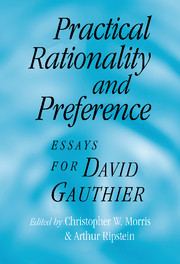Book contents
- Frontmatter
- Contents
- List of Contributors
- Practical Reason and Preference
- What Do Expressions of Preference Express?
- Preference
- Rational Temptation
- Bombs and Coconuts, or Rational Irrationality
- Are Intentions Reasons? And How Should We Cope with Incommensurable Values?
- Two Forms of Practical Generality
- Psychology for Cooperators
- Which Games Should Constrained Maximizers Play?
- The Strategy of Cooperation
- We Were Never in Paradise
We Were Never in Paradise
Published online by Cambridge University Press: 11 January 2010
- Frontmatter
- Contents
- List of Contributors
- Practical Reason and Preference
- What Do Expressions of Preference Express?
- Preference
- Rational Temptation
- Bombs and Coconuts, or Rational Irrationality
- Are Intentions Reasons? And How Should We Cope with Incommensurable Values?
- Two Forms of Practical Generality
- Psychology for Cooperators
- Which Games Should Constrained Maximizers Play?
- The Strategy of Cooperation
- We Were Never in Paradise
Summary
Contractarianism
Liberal contractarian political and moral theory, based in accounts of practical rationality, sets itself the task of identifying a reasonable set of conditions under which individual persons, conceived as having no necessary tie to one another, can form orderly societies for the sake of mutual benefit. Clearly, if individuals have no necessary tie with one another, there is no reason to expect that they will protect each other's interests. Nor is there any reason to suppose that one individual or group will gladly sacrifice its private good for the common weal, or for the well-being of another. And clearly, we cannot expect to have a stable, well-ordered society if each of us is prepared to do anything in her power to get what she wants, no matter what the cost to her fellows.
While it could turn out that every potential citizen in the desired common-wealth would just happen to be a lovely person who never would want a thing that would jeopardize others' interests, there is no reason to expect this happy turn of events, and, anyway, the aim of contractarian theory is to determine what rational social life would be like no matter how good-natured or ill-tempered the members of the society might be. The question for contractarian theory becomes, What kind of concessions should individuals make for the sake of cooperative social life?
- Type
- Chapter
- Information
- Practical Rationality and PreferenceEssays for David Gauthier, pp. 209 - 239Publisher: Cambridge University PressPrint publication year: 2001



